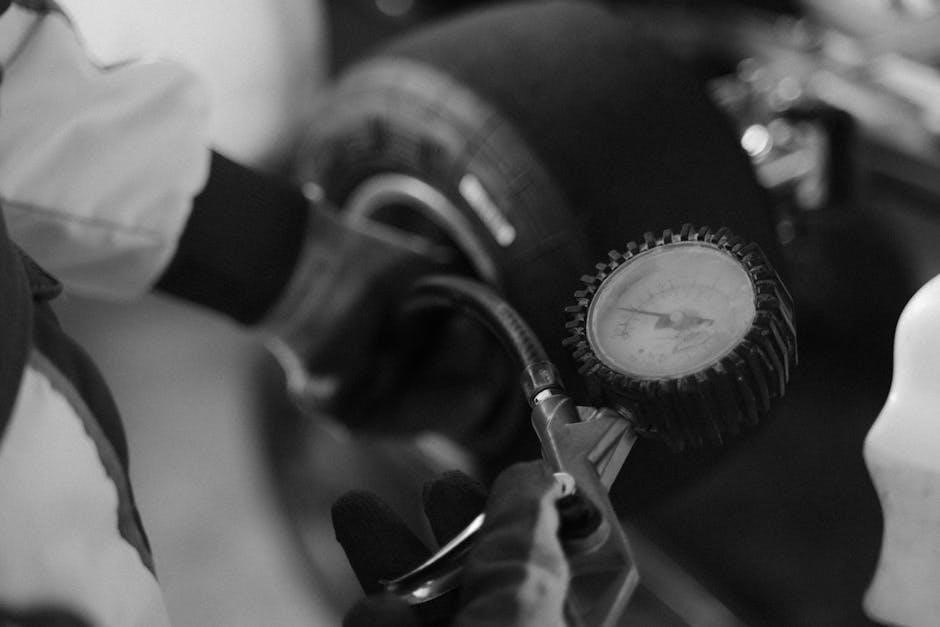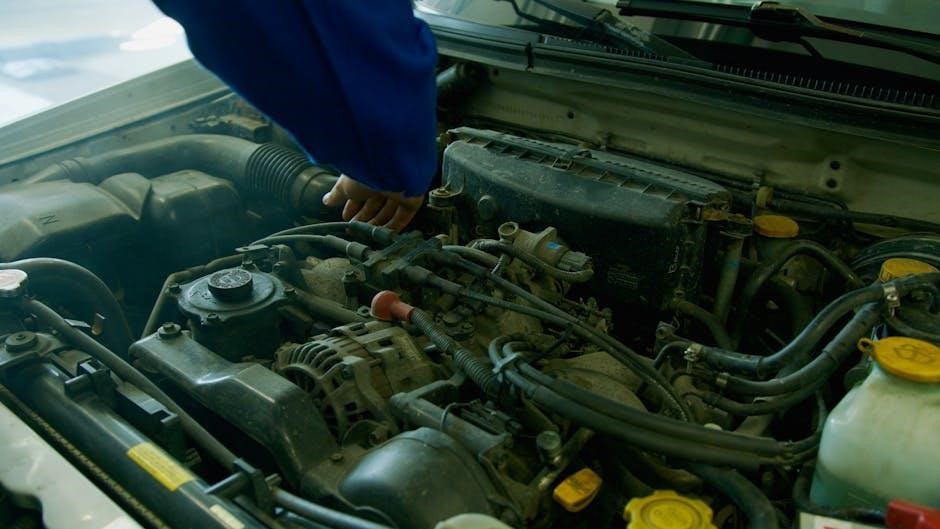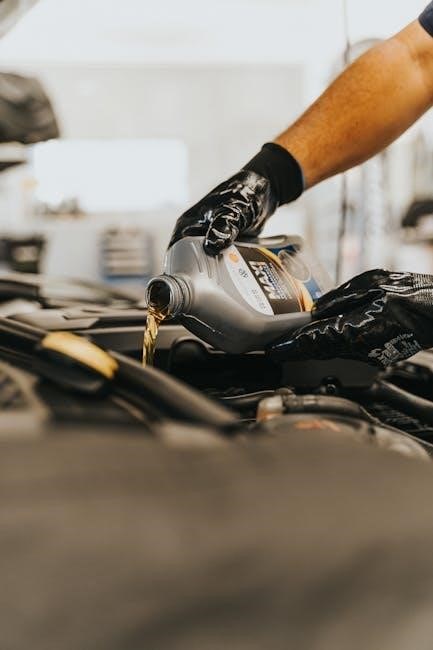The “Oil Pressure Engine Off” warning in VW vehicles signals critical lubrication failure, often due to low oil levels, sensor malfunctions, or blockages, requiring immediate attention to prevent engine damage.
1.1 Understanding the “Oil Pressure Engine Off” Warning
The “Oil Pressure Engine Off” warning indicates critically low oil pressure, essential for engine lubrication. Ignoring it risks severe engine damage. Common causes include faulty sensors or blockages. Immediate engine shutdown is crucial to prevent further harm. Consulting the owner’s manual for guidance is recommended. This alert underscores the need for prompt action to safeguard your VW’s engine.
1.2 Importance of Addressing the Issue Immediately
Ignoring the “Oil Pressure Engine Off” warning can lead to severe engine damage, costly repairs, or even complete engine failure. Immediate action is crucial to prevent irreversible harm to critical components. Shutting off the engine and addressing the issue promptly ensures the longevity and performance of your VW. Delaying repairs can escalate the problem, making it more expensive and complicated to resolve.

Common Causes of Low Oil Pressure in VW Engines
Low oil levels, faulty sensors, malfunctioning pumps, blockages, and oil leaks are common causes of low oil pressure in VW engines, requiring immediate attention.
2.1 Low Oil Level
A low oil level is a primary cause of reduced oil pressure in VW engines. Insufficient oil fails to lubricate moving parts, leading to increased friction and potential engine damage. Drivers should check the oil level using the dipstick or electronic gauge, ensuring it meets the manufacturer’s recommended level. Adding the correct grade of oil can resolve this issue promptly, preventing further complications.
2.2 Faulty Oil Pressure Sensor
A faulty oil pressure sensor can trigger the “Oil Pressure Engine Off” warning, even if actual oil pressure is normal. This sensor monitors oil pressure and sends data to the car’s computer. A malfunctioning sensor may provide false readings, causing the system to erroneously shut down the engine. Drivers should inspect the sensor and its wiring for damage or corrosion, ensuring accurate pressure readings to avoid unnecessary engine shutdowns.
2.3 Malfunctioning Oil Pump
A malfunctioning oil pump is a common cause of low oil pressure in VW engines. The pump’s failure to circulate oil effectively can lead to insufficient lubrication, triggering the “Oil Pressure Engine Off” warning. Drivers should inspect the pump for wear or damage, such as excessive play in the turbine, which can indicate a drop in pressure. Replacing a faulty pump is often necessary to restore proper oil flow and prevent engine damage.
2.4 Blockages in the Oil Pickup Tube
Blockages in the oil pickup tube can severely restrict oil flow, leading to low pressure. Debris, sludge, or carbon buildup often clog the tube, reducing lubrication to critical engine components. Drivers may notice intermittent warnings, especially during spirited driving. Professional inspection and cleaning or replacement of the tube are essential to restore proper oil circulation and prevent irreversible engine damage.
2.5 Leaking Oil Pressure Switch
A leaking oil pressure switch can trigger false low-pressure warnings, leading to the “Oil Pressure Engine Off” alert. Located near the oil filter housing, the switch is prone to failure due to harsh conditions. Leaks or damaged connectors can disrupt accurate pressure readings, causing the dashboard warning. Ignoring this issue risks engine damage, as it may indicate or cause actual pressure loss. Replacing the switch is often a cost-effective solution to resolve the problem and restore proper system function.

Immediate Steps When the “Oil Pressure Engine Off” Warning Appears
Pull over safely, switch off the engine, and avoid further driving. Check the oil level and contact roadside assistance if necessary to prevent severe engine damage.
3.1 Pulling Over Safely
When the “Oil Pressure Engine Off” warning appears, pull over to a safe location immediately. Avoid sudden braking or accelerating. Use your hazard lights to signal other drivers. Do not continue driving, as this can cause severe engine damage. Find a flat, stable surface away from traffic to ensure your safety while addressing the issue.
3.2 Switching Off the Engine
Once safely pulled over, turn the engine off immediately to prevent further damage. Avoid idling, as this can exacerbate the issue. Switching off the engine halts the potential for additional wear on internal components. Ensure the ignition is in the off position to avoid any unintended engine operation. This step is crucial to protect your engine until the cause of the low oil pressure is diagnosed and repaired.
3.3 Avoiding Further Driving
Continuing to drive with the “Oil Pressure Engine Off” warning can lead to severe engine damage, including seized components and costly repairs. Stop immediately to prevent further wear on critical parts like camshafts and bearings. Do not restart the engine until the issue is resolved. Seek professional assistance or roadside help to avoid irreversible damage and ensure your safety on the road.

Diagnosing the Oil Pressure Issue
Diagnosing low oil pressure involves checking oil levels, inspecting the oil pressure sensor, examining the oil pump for damage, and identifying potential blockages in the oil system.
4.1 Checking the Oil Level
Checking the oil level is the first step in diagnosing low oil pressure issues. Locate the oil dipstick or electronic oil level sensor. Pull out the dipstick, wipe it clean, and insert it back to get an accurate reading. If using an electronic system, refer to the dashboard gauge. Low oil levels can trigger the “Oil Pressure Engine Off” warning. Add oil as needed to reach the recommended level. Ensure the correct viscosity is used to maintain proper engine lubrication.
4.2 Inspecting the Oil Pressure Sensor
The oil pressure sensor monitors engine oil pressure and sends data to the car’s computer. A faulty sensor can cause false warnings, even if oil pressure is normal. Locate the sensor near the oil filter housing and inspect for damage or corrosion. Check the wiring and connections for issues. If the sensor is malfunctioning, replace it with a genuine VW part to ensure accurate readings and prevent further warnings. This step is crucial for resolving the “Oil Pressure Engine Off” alert accurately.
4.3 Examining the Oil Pump for Damage
The oil pump is crucial for maintaining proper oil circulation and pressure. Inspect it for signs of wear, blockages, or failure. Check for excessive play in the pump’s turbine, which can indicate internal damage. Ensure the pump is properly installed and functioning. If damaged, the pump must be replaced to restore adequate oil pressure and prevent engine damage. This step is vital for resolving persistent low oil pressure issues in VW engines.
4.4 Identifying Blockages in the Oil System
Blockages in the oil pickup tube or filter housing can restrict oil flow, leading to low pressure. Inspect the oil pickup tube for debris or carbon buildup, which can obstruct flow. Ensure the oil filter is clean and properly installed. If blockages are found, clean or replace the affected components to restore proper oil circulation and pressure, preventing further engine damage in VW vehicles.
Common Solutions for Oil Pressure Problems
Addressing oil pressure issues in VW engines involves replacing faulty sensors, cleaning blockages, and ensuring adequate oil levels. Timely repairs prevent severe engine damage and costly overhauls.
5.1 Replacing the Oil Pressure Switch
The oil pressure switch, often located near the oil filter housing, is a common culprit in oil pressure warnings. Over time, it can fail due to harsh engine conditions. Replacing it is a straightforward process that involves disconnecting the electrical connector and removing the old switch. Installing a new one can resolve the “Oil Pressure Engine Off” warning and restore proper system functionality, preventing further engine damage.
5.2 Fixing or Replacing the Oil Pump
The oil pump is crucial for maintaining proper engine lubrication. If it fails, oil pressure drops, triggering the “Oil Pressure Engine Off” warning. Inspecting the pump for damage or wear is essential. In some cases, cleaning or repairing the pump can resolve the issue, but often, a replacement is necessary to ensure reliable oil circulation and prevent severe engine damage, especially in older VW models with high mileage.
5.3 Cleaning or Replacing the Oil Pickup Tube
The oil pickup tube draws oil from the sump to the engine. Blockages, often caused by debris or sludge, can restrict oil flow, leading to low pressure. Cleaning the tube or replacing it if damaged ensures proper oil circulation. This step is critical to restore adequate lubrication and prevent engine damage, especially in cases where blockages are the root cause of the “Oil Pressure Engine Off” warning in VW vehicles.
5.4 Addressing Oil Leaks
Oil leaks, particularly from the oil filter housing or gaskets, can lead to low oil pressure. These leaks reduce the oil level, disrupting engine lubrication. Replacing worn gaskets or damaged housing components is essential to restore proper oil containment and maintain consistent pressure, ensuring the engine operates smoothly without triggering the “Oil Pressure Engine Off” warning.
The Role of the Oil Pressure Sensor
The oil pressure sensor monitors engine oil pressure and sends data to the car’s computer, ensuring proper lubrication. A faulty sensor can cause false readings, leading to unnecessary engine shutdowns and potential damage.
6.1 How the Sensor Works
The oil pressure sensor operates by detecting the pressure of engine oil circulating through the system. It converts this mechanical pressure into an electrical signal, which is then transmitted to the vehicle’s ECU (Engine Control Unit). This data is crucial for the ECU to monitor and regulate engine performance. If the pressure drops below a certain threshold, the sensor triggers a warning, such as the “Oil Pressure Engine Off” alert, to protect the engine from damage caused by insufficient lubrication.
6.2 Signs of a Faulty Sensor
Common indicators of a faulty oil pressure sensor include the illumination of the “Oil Pressure Engine Off” warning light on the dashboard, even when oil levels are adequate. The sensor might also cause erratic or fluctuating readings on the oil pressure gauge. In some cases, the engine may experience stalling or difficulty starting due to incorrect pressure data being relayed to the vehicle’s computer, leading to potential misdiagnosis of other issues.
6.3 Replacing the Sensor
Replacing the faulty oil pressure sensor involves disconnecting the battery, locating the sensor near the oil filter housing, and unplugging its connector. Remove the old sensor, install the new one, and reconnect the wiring. Tighten securely and reconnect the battery. Start the engine to test if the warning light disappears. If unsure, consult a professional to ensure proper installation and avoid further engine issues.
Understanding the Oil Filter Housing and Gasket Issues
The oil filter housing, located on the engine block, can develop leaks due to worn gaskets, causing oil pressure issues and triggering the engine warning system.
7.1 Location and Function of the Oil Filter Housing
The oil filter housing is typically located near the engine block, holding the oil filter and gaskets. Its primary role is to secure the filter and ensure clean oil circulates through the engine. A malfunction here can lead to leaks, reducing oil pressure and triggering the “Oil Pressure Engine Off” warning, as indicated in various VW owner reports and repair forums.
7.2 Identifying Leaks in the Housing
Leaks in the oil filter housing are often visible as oil droplets or stains near the gasket areas. Inspect the housing for cracks or worn gaskets, which can cause oil to seep out, leading to low pressure warnings. Heat from the engine block can exacerbate gasket wear, so checking for signs of overheating is also crucial. Regular inspection helps prevent such issues before they trigger the “Oil Pressure Engine Off” alert.
7.3 Replacing the Gaskets
Replacing the gaskets in the oil filter housing involves removing the old, worn-out seals and installing new ones. Ensure the housing is clean and free of debris before fitting the new gaskets. Tighten all connections securely to prevent leaks. Properly seated gaskets will restore oil pressure and prevent further warnings. Always use OEM or high-quality replacement parts for reliability and longevity.

The Impact of Carbon Buildup on Oil Pressure
Carbon buildup in the engine can block oil pathways, reducing flow and pressure. This leads to the “Oil Pressure Engine Off” warning, requiring immediate attention to prevent damage.
8.1 Causes of Carbon Buildup
Carbon buildup in VW engines is often caused by poor fuel quality, infrequent oil changes, and high-mileage wear. Over time, residue accumulates, narrowing oil passages and reducing pressure. This can trigger the “Oil Pressure Engine Off” warning, signaling a need for immediate intervention to prevent engine damage. Regular maintenance and using high-quality oil can help mitigate this issue.
8.2 Effects on Oil Flow and Pressure
Carbon buildup restricts oil flow, reducing pressure and lubrication to critical engine components. This can trigger the “Oil Pressure Engine Off” warning, signaling potential engine damage. Blockages in the oil pickup tube or passageways impede proper oil circulation, leading to inadequate pressure. If ignored, this can result in severe engine damage, emphasizing the importance of addressing the issue promptly to maintain engine health and functionality.
8.3 Cleaning and Maintenance Tips
Regularly cleaning the oil system helps prevent carbon buildup. Use a fuel injector cleaner to dissolve deposits and flush the engine. Check the oil filter housing for leaks or blockages. Replace the oil pickup tube screen if clogged. Perform frequent oil changes and consider synthetic oil for better high-temperature performance. These steps maintain optimal oil flow and pressure, reducing the risk of engine damage and warning alerts.

Tools and Equipment Needed for Diagnosis and Repair
Essential tools include an OBD-II scanner, oil pressure gauge, socket set, and torque wrench. These help diagnose issues, measure pressure, and perform repairs efficiently on VW engines.
9.1 Essential Tools for Oil Pressure Checks
An OBD-II scanner helps identify fault codes, while a mechanical oil pressure gauge measures accurate pressure readings. A socket set and torque wrench are necessary for accessing the oil pump and sensor. These tools enable quick diagnosis of issues like faulty sensors or blockages, ensuring precise repairs and preventing further engine damage when addressing the “Oil Pressure Engine Off” warning in VW vehicles.
9.2 Diagnostic Equipment for Advanced Issues
For advanced diagnostics, a pressure test kit is essential to simulate real-world driving conditions and identify intermittent oil pressure issues. A digital multimeter helps verify sensor voltages and wiring integrity. Additionally, OEM-specific diagnostic tools provide detailed system insights and calibration capabilities. These advanced tools enable precise troubleshooting of complex oil pressure problems, ensuring accurate repairs and preventing further engine damage in VW vehicles with the “Oil Pressure Engine Off” warning.

Preventative Maintenance to Avoid Oil Pressure Issues
Regular oil changes and filter replacements are crucial to maintain optimal oil pressure. Inspecting the oil system for leaks and blockages, and monitoring for early warning signs, ensures long-term engine health in VW vehicles, preventing the “Oil Pressure Engine Off” warning from appearing unexpectedly.
10.1 Regular Oil Changes
Regular oil changes are essential to maintain proper oil pressure in VW engines; Fresh oil ensures optimal lubrication and prevents viscosity breakdown. Typically, oil should be changed every 5,000 to 7,500 miles, depending on usage. Neglecting this can lead to reduced oil pressure, engine wear, and potentially trigger the “Oil Pressure Engine Off” warning. Consistent maintenance helps preserve engine health and prevents costly repairs down the road, ensuring your VW runs smoothly for years.
10.2 Inspecting the Oil System
Regularly inspecting the oil system in your VW is crucial for maintaining proper oil pressure. Check the oil filter housing for leaks and ensure it’s tightly sealed. Inspect the oil pickup tube for blockages or debris that could restrict oil flow. Additionally, examine the oil pressure sensor and its connections for damage or corrosion. Addressing these areas helps prevent low oil pressure warnings and potential engine damage, ensuring your vehicle runs smoothly and reliably.
10.3 Monitoring for Early Signs of Trouble
Monitoring your VW for early signs of oil pressure issues is vital for preventing engine damage. Look for intermittent warnings, unusual engine noises, or performance issues during acceleration. Pay attention to dashboard alerts, as they often indicate low oil pressure or sensor malfunctions. Addressing these signs promptly can help avoid costly repairs. Regular oil checks and system inspections are key to maintaining optimal engine health and preventing “Oil Pressure Engine Off” scenarios.

Conclusively Checking the Oil Pressure Issue
After addressing the issue, inspect the oil system thoroughly and test the engine to ensure proper oil pressure is restored and the warning does not reappear.
11.1 Final Inspection Before Restarting the Engine
Before restarting, ensure the oil level is correct, inspect the oil filter housing for leaks, and verify all connections are secure. Check the oil pressure sensor for damage or loose wiring. Confirm that any repairs, such as replacing the oil pressure switch or cleaning blockages, have been completed. Addressing these issues ensures safe engine operation and prevents further damage from low oil pressure conditions.
11.2 Testing the Engine After Repairs
After completing repairs, start the engine and monitor the dashboard for any recurring warnings. Ensure the oil pressure light remains off and the engine operates smoothly. Check for leaks around the oil filter housing and connections. Perform a test drive under various conditions to confirm stable oil pressure and proper engine performance, ensuring the issue is fully resolved before regular use.
The “Oil Pressure Engine Off” warning in VW vehicles is critical, often caused by low oil levels, sensor issues, or blockages. Addressing these promptly prevents severe engine damage and ensures long-term reliability. Regular maintenance and immediate repairs are essential for sustaining your vehicle’s health and performance.
12.1 Summary of Key Points
The “Oil Pressure Engine Off” warning in VW vehicles indicates a critical issue requiring immediate attention. Low oil levels, faulty sensors, or system blockages are common causes. Ignoring this warning can lead to severe engine damage or failure. Prompt action, such as checking oil levels and addressing potential malfunctions, is essential to prevent long-term harm. Regular maintenance and timely repairs are vital for ensuring engine longevity and performance.
12.2 Final Recommendations for VW Owners
VW owners should prioritize regular oil changes, inspect the oil system for leaks or blockages, and monitor for early signs of low oil pressure. Addressing issues promptly, such as replacing faulty sensors or cleaning the oil pickup tube, can prevent severe engine damage. Always refer to the owner’s manual for guidance and seek professional help if the “Oil Pressure Engine Off” warning persists.